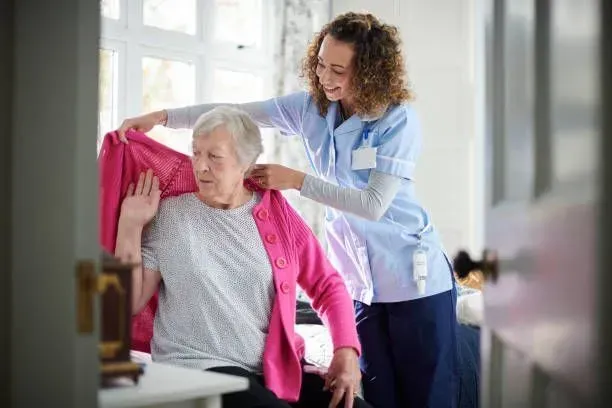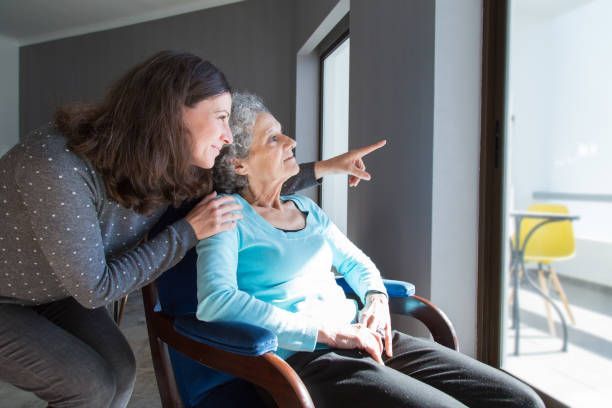Early Signs of Lewy Body Dementia
Early Signs of Lewy Body Dementia
Mayo Clinic explains "Lewy body dementia is the second most common type of dementia after Alzheimer's disease. Protein deposits called Lewy bodies develop in nerve cells in the brain. The protein deposits affect brain regions involved in thinking, memory and movement. This condition is also known as dementia with Lewy bodies. Lewy body dementia causes a decline in mental abilities that gradually gets worse over time. People with Lewy body dementia might see things that aren't there. This is known as visual hallucinations. They also may have changes in alertness and attention. People with Lewy body dementia might experience Parkinson's disease symptoms. These symptoms may include rigid muscles, slow movement, trouble walking and tremors."

Are You Searching for a Home Care Agency Near Me
Trained and Experienced in Dementia Care?
Serving the New York Metropolitan area, 7 Day Home Care is a licensed home care agency specializing in dementia care. Our team of highly trained and experienced home health aides undergo specialized training to provide compassionate and personalized assistance for individuals with dementia, including Lewy body dementia. 7 Day Home Care prioritizes understanding each client's unique needs and preferences, creating customized care plans that empower individuals with dementia to maintain their independence and sense of self within the comfort and familiarity of their own home
What is Lewy Body Dementia?
Lewy Body Dementia (LBD) is a progressive and complex neurodegenerative disorder characterized by the abnormal accumulation of alpha-synuclein protein deposits, known as Lewy bodies, within the brain's neurons. These Lewy bodies primarily affect areas of the brain responsible for cognitive functions, motor control, and autonomic nervous system regulation. This disorder is marked by a range of symptoms, including cognitive decline similar to Alzheimer's disease, movement difficulties akin to Parkinson's disease, and severe fluctuations in alertness and attention. Patients often experience visual hallucinations, REM sleep behavior disorder (where they physically act out dreams), and severe sensitivity to medications commonly used to treat hallucinations and agitation. The interplay of these diverse symptoms makes LBD particularly challenging to diagnose and manage. The presence of Lewy bodies disrupts communication between brain cells, leading to the gradual deterioration of mental and physical abilities. Understanding and identifying the early signs of LBD can significantly impact the quality of care and management strategies, offering patients and their families a better understanding of the disease and its progression.
Early Signs of Lewy Body Dementia
While the symptoms of Lewy Body Dementia can vary from person to person, several early signs may indicate the presence of the condition. It's essential to recognize these signs and seek medical evaluation for proper diagnosis and management. Some common early indicators of LBD include:
- Fluctuating Cognitive Function: Individuals with LBD may experience fluctuations in cognitive abilities, such as memory, attention, and executive function. These fluctuations can manifest as periods of clarity followed by confusion or disorientation. Loved ones may notice that the person's cognitive abilities vary throughout the day or from one day to the next.
- Visual Hallucinations: Visual hallucinations are a hallmark symptom of Lewy Body Dementia, often occurring early in the disease course. These hallucinations may involve seeing people, animals, or objects that are not present. Individuals with LBD may also experience illusions, where they misinterpret real objects or people as something else.
- Parkinsonism Symptoms: LBD shares several motor symptoms with Parkinson's disease, including bradykinesia (slowed movement), rigidity, and tremors. These Parkinsonism symptoms may appear early in the course of LBD and can affect mobility and balance.
- REM Sleep Behavior Disorder (RBD): Many individuals with Lewy Body Dementia experience REM sleep behavior disorder, characterized by vivid, often violent dreams and acting out during sleep. This condition may precede other LBD symptoms by several years and can be a significant early indicator of the disease.
- Orthostatic Hypotension: Orthostatic hypotension, or a sudden drop in blood pressure when standing up, is common in individuals with LBD. This symptom may cause dizziness, lightheadedness, or fainting spells, especially when transitioning from lying down to standing up.
- Sensitivity to Neuroleptic Medications: Individuals with LBD may have an increased sensitivity to certain medications, particularly neuroleptics or antipsychotic drugs. These medications can worsen LBD symptoms and may lead to severe adverse reactions, including confusion, delirium, and motor impairment.
Recognizing the early signs of Lewy Body Dementia is essential for timely intervention and appropriate care. While LBD poses unique challenges, early detection and management can help improve quality of life and maintain independence for individuals living with the condition. It's also essential to note that the information provided in this article is for educational purposes only. It is not intended as a substitute for professional medical advice, diagnosis, or treatment. If you or a loved one experience any concerning symptoms or changes in cognitive function, it's crucial to seek medical evaluation from a qualified healthcare professional. With proper diagnosis and support, individuals with LBD can receive the care and assistance they need to navigate the challenges of this complex condition.
Home Health Aide Agency Near You and In-Home Dementia Care
At 7 Day Home Care, we understand the unique needs of individuals living with dementia, including Lewy Body Dementia. Our highly trained and experienced home health aides provide compassionate and personalized care to clients in Manhattan, Queens, Brooklyn, and Long Island, New York. If you require dementia care services for yourself or a loved one, please contact us at 516-408-0034 or vist
7 Day Home Care for more information on how we can support your needs.
Brian Callahan
7 Day Home Care










